On July 29, at the CONTECON’s facilities in the Port of Guayaquil, the first export of sustainable Amazonian coffee with deforestation-free certification was carried out between the Regional Federation of Associations of Small Ecological Coffee Growers of the South (FAPECAPES in Spanish) and the Italian company Lavazza. The milestones for national coffee growers was achieved thanks to the leadership of the Ministry of the Environment, Water, and Ecological Transition (MAATE), the Ministry of Agriculture and Livestock (MAG), through PROAmazonía, with support from the United Nations Development Programme (UNDP).
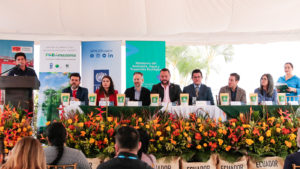
Photos: Communication unity – PROAmazonía
Description: Deforestation-free sustainable Amazonian coffee export event
The sale of the container of 250, 69kg bags of mixed coffee (Arabica and Robusta) with organic and specialty certification was carried out in February 2022, and in July its shipment to Italy was finalized. This batch will allow producers to access a new market niche, due to its high quality, sustainability, and commitment to non-deforestation, in addition to representing a high growth potential and income improvement in the medium-term for more than 400 producers of the Ecuadorian Amazon and their families.
During the day, the Undersecretary of Climate Change, Karina Barrera, stressed that this milestone is part of the REDD+ strategy, a strategy that the country has adopted for the fight against deforestation. “Today we are showing the world that sustainable and deforestation-free production is possible,” Barrera said.
The export process was carried out through FEPECAPES, an organization that is formed by six Small Coffee Growers Associations of the southern region of Ecuador that are located in the Provinces of El Oro, Loja, and Zamora Chinchipe. Precisely, for this sale, 100% of raw material was collected by the Agro-artisanal Association of Organic Producers of Palanda and Chinchipe (APECAP) and the Association of Organic Coffee Producers Cuencas del Río Mayo (ACRIM), organizations that are part of the pilot of lifting farm perimeters that identify the forests to be conserved, and traceability, which has been promoted through PROAmazonía.
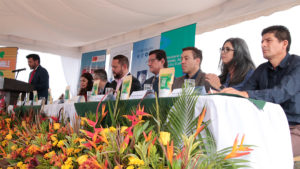
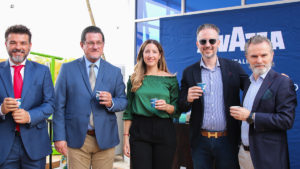
Photo: Communication Unit – PROAmazonía
Description: Deforestation-free sustainable Amazonian coffee export event
APECAP and ACRIM associations are part of the deforestation-free production traceability pilot, which includes the use of an open-source technology tool that uses cell phones to map each producer’s farm perimeters and identify the forest areas they intend to conserve.
Mr. Harvey Merino, representative of FAPECAFES indicated, on behalf of his colleagues, that they are committed to a deforestation-free production: “From the cradle of cacao, coffee, and honey, Zamora, land of brave people, we represent the producers who fight in the field. I bring this message of commitment to staying in sustainable and deforestation-free production. This is a reflection of the joint work, the government and its state portfolios, and us, as producers who have organized ourselves and shown that we can make changes in the productive agricultural system”.
Likewise, the initiative is made within the framework of the Memorandum of Understanding (MOU) subscribed at the beginning of 2019, between UNDP and Lavazza, where Ecuador was selected as a pilot country, due to the progress generated in the reduction of deforestation and in the willingness to work on deforestation-free coffee production. During 2021, with the support of PROAmazonía, several coffee samples were shipped to Italy and in December of that same year, the interest to initiate negotiations for the purchase of an Amazonian coffee container under forest conservation monitoring was confirmed.
The sale to Lavazza sets a milestone at the national and international level, constituting Ecuador’s pioneering initiative of sustainable and deforestation-free production with a focus on reducing greenhouse gas emissions caused by deforestation and forest degradation (REDD+).
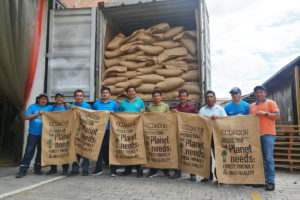
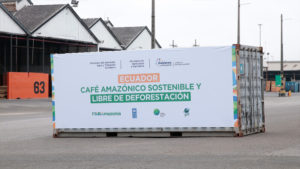
Photo: Communication Unit – PROAmazonía
Description: Deforestation-free sustainable Amazonian coffee export event
“Exporting coffee to the world is not easy, it involves huge logistics and it is our effort, as the Ministry of Agriculture and Livestock, that these producers can associate, can access medium and long-term credits, and that they are profitable. This is a milestone in Ecuador’s agriculture. Today, we are exporting coffee and in two years we will be required to have all our products certified, ensuring that they do not affect the environment or cut down our forests,” said Mr. Juan Pablo Trujillo, Commercial Director of MAG.
The Deputy Minister of the Environment, Mr. José Antonio Dávalos Hernández concluded the event by highlighting that REDD+’s strategy is a public policy that, in addition to conserving and restoring forests, generates economic, social, and even cultural opportunity for the populations living in the forests. “Today is a memorable day, as it is the first export of Ecuadorian sustainable Amazonian coffee that has a deforestation-free certification. It is really a special day, which sends a clear message to the world: Ecuador is a productive, agricultural country committed to conservation.”
Ecuador is aiming to support small farmers to actively participate in sustainable production processes, accompanied by companies which guide them to improve their quality, productivity and generate a better price. In this way, producers find a stimulus by participating in the international market, which recognizes their forest conservation efforts, so they consolidate their commitment to a sustainable and deforestation-free production.
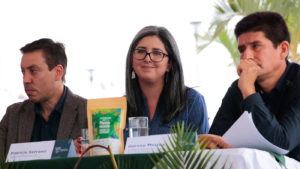
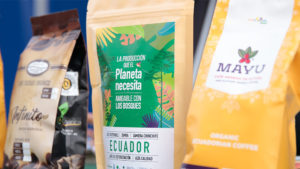
Photo: Communication Unit – PROAmazonía
Description: Deforestation-free sustainable Amazonian coffee export event
The event was attended by José Antonio Dávalos Hernández, Deputy Minister (e) Ministry of the Environment, Water and Ecological Transition, Oscar Torre, Undersecretary of Marketing of the Ministry of Agriculture and Livestock, Pablo Rizzo, Chairman of the Board of Directors of the Port Authority of Guayaquil, Karina Barrera, Undersecretary of Climate Change of the Ministry of the Environment, Water and Ecological Transition, Mario Rodas, Head of the Environment and Energy Area of UNDP, Patricia Serrano, Manager of PROAmazonía, Juan Pablo Trujillo Commercial Director of CONTECON y Harvey Merino, President of APECAP and Member of the Board of Directors of FAPECAFÉS.
Key facts:
- FAPECAFES was founded in 2002, when seven associations of small coffee producers from different areas in the southern region of Ecuador came together with the goal of accumulating a sufficient volume for export and to expand their bargaining power with international importers and roasters. The organization is made up of 1,200 families of producers organized in grassroots associations such as:
- Agro-artisanal Association of Organic Producers of Special Coffee of the Loja Canton (APECAEL)
- Agro-artisanal Association of High Grown Coffee Puyango (PROCAP)
- Association of Small Exporters of Specialty Coffee of Marcabelí (APECAM)
- Agro-artisanal Association of High Grown Coffee Producers of Espíndola and Quilanga (PROCAFEQ)
- Agro-artisanal Association of Ecological Producers of Palanda and Chinchipe (APECAP)
- Association of Ecological Producers of Organic Coffee Cuencas del Río Mayo (ACRIM)
- Between September 22 and 24, 2021, a series of virtual trainings were imparted to more than 50 Amazonian coffee producers, with experts from Lavazza, in which relevant topics for the coffee sector were addressed, such as global market trends and logistics. Overcoming the barriers of virtuality, a module on sensorial analysis was also developed through a coffee tasting. On the other hand, from June 27 to 29, 2022, at the Innovation Center of Lavazza (Torino-Italy), a delegation made up by coffee producers, the Ministry of the Environment, Water and Ecological Transition, and PROAmazonía participated in an on-site workshop, in which they were trained in the areas of tasting, coffe selection, and preparation.
- PROAmazonía has supported the implementation of 12 Field Schools with a group of 223 producers from APECAP and ACRIM, who received training in productive, environmental, commercial, and cooperative topics. Also, 2 Collection Centers have been repowered (Centers for APECAP and ACRIM – post-harvest infraestructure) with the goal of maintaining the quality of the coffee produced and improving its processing.
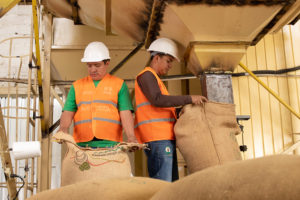
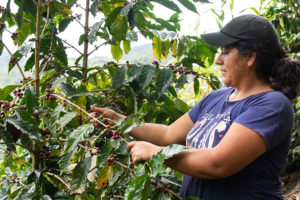
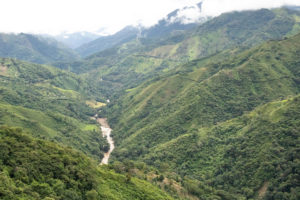
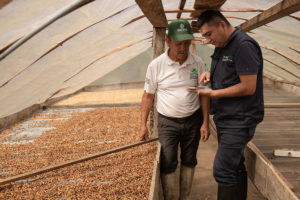
Photo: Communication Unit – PROAmazonía
Description: Coffe Producers
 Español
Español English
English
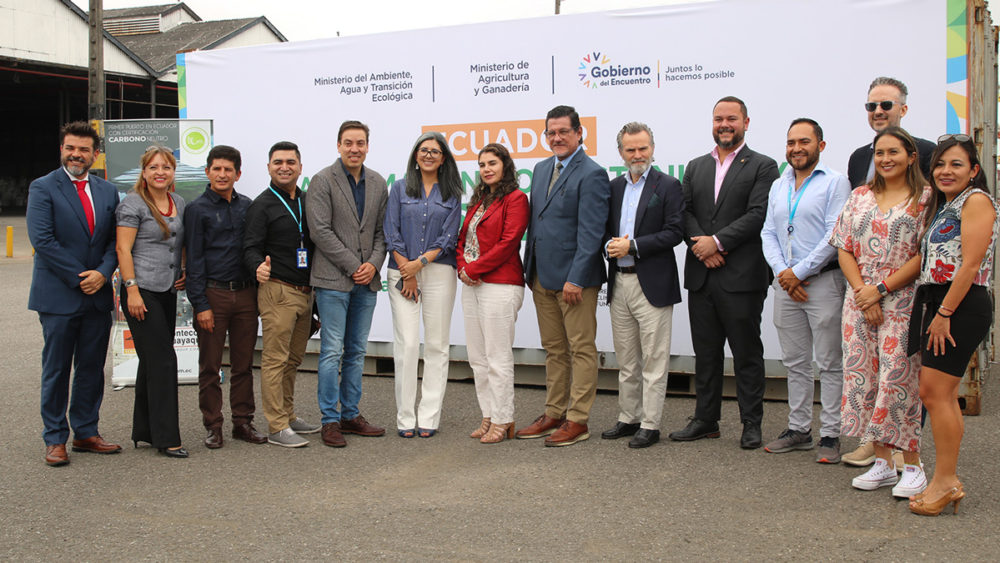
Reciba un cordial saludo
Mi nombre es Magdalena Cevallos represento a una empresa extranjera necesito cafe y cacao para exportación por favor comunicarse al 0997009687
Estimada Magdalena, muchas gracias por escribirnos, favor contactarnos al número a continuación:
0999462110 Juan Merino